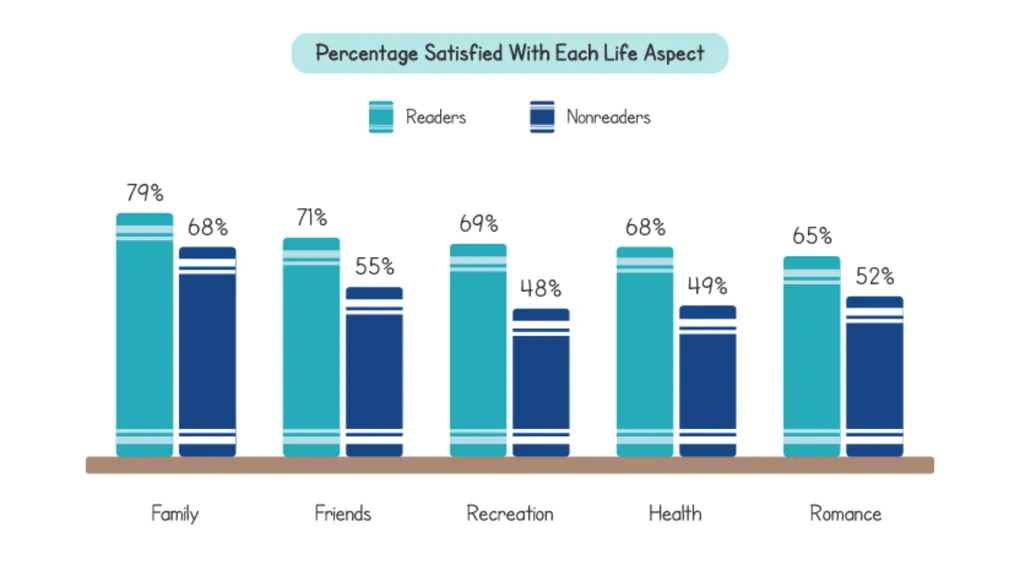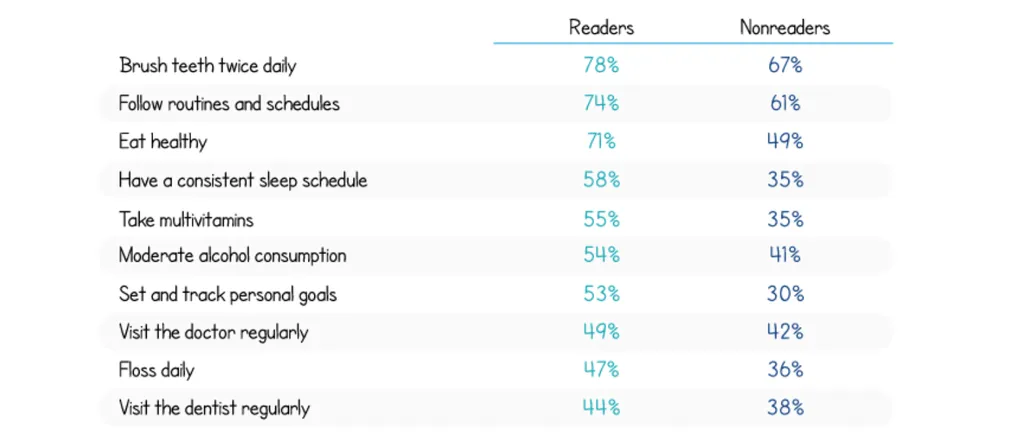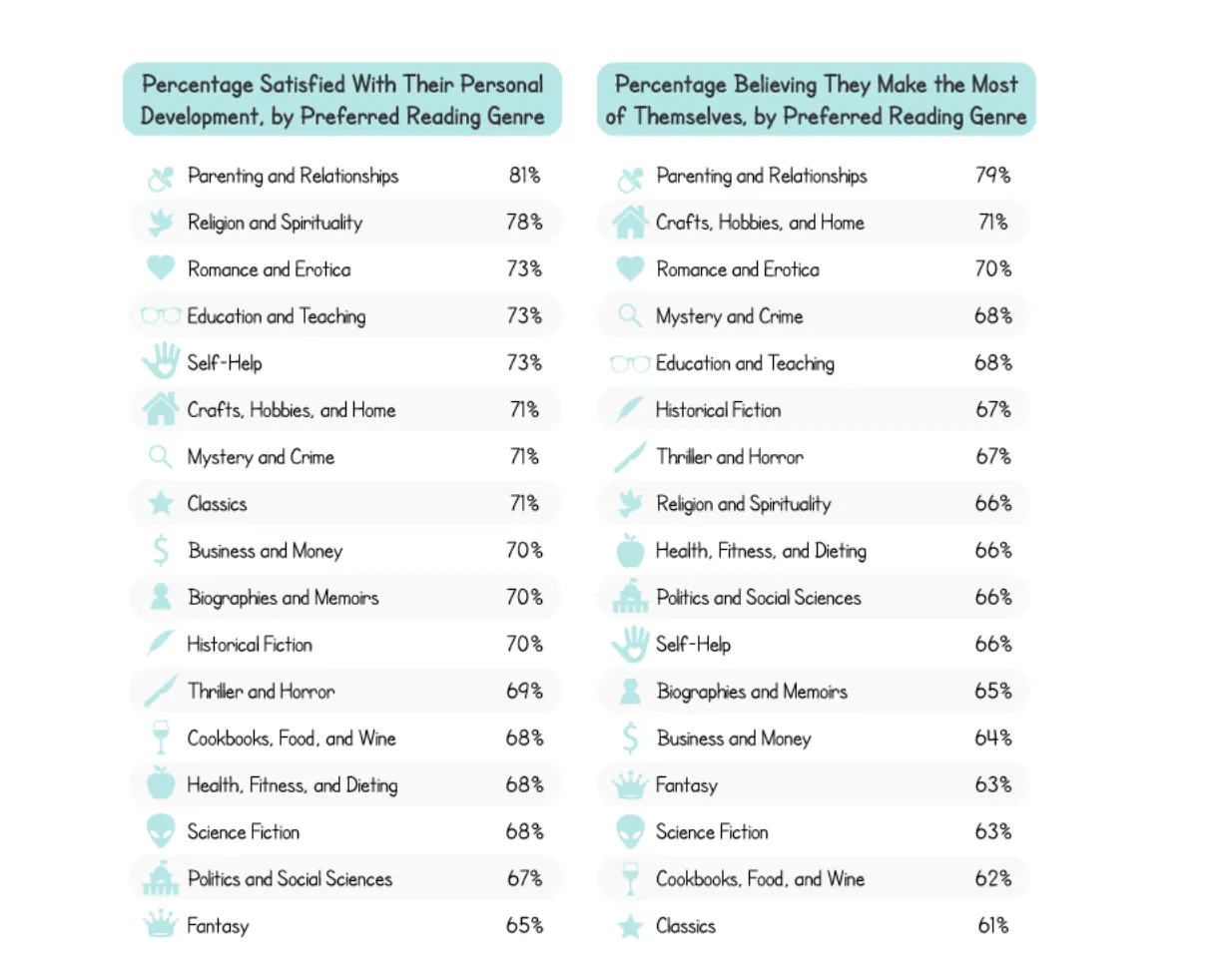
Readers Are More Satisfied With Their Lives Than Nonreaders, New Study Suggests
Studies have shown that readers are more empathetic and that it can improve cognitive function. A new study by SuperSummary, an online resource that provides in-depth study guides, suggests reading has yet another benefit: self-identified readers are more satisfied with their lives than those who don’t identify as readers.
 The starkest difference in satisfaction between readers and nonreaders came with recreation: readers are far more satisfied than nonreaders. This could be because readers find satisfaction with the act of reading itself. Health was another area with nearly a 20% difference in satisfaction.
The starkest difference in satisfaction between readers and nonreaders came with recreation: readers are far more satisfied than nonreaders. This could be because readers find satisfaction with the act of reading itself. Health was another area with nearly a 20% difference in satisfaction.
 Readers have more healthful habits than nonreaders. The difference in the percentages of readers who eat healthfully and have consistent sleep schedules is much higher than nonreaders. While SuperSummary’s report suggests this is because readers have higher self-regard and reported they control over life outcomes and a vision of what they wanted out of their life, it doesn’t suggest that reading as a leisure activity—and indeed, defining what “reading” is—is affected by socioeconomic class.
Time to read suggests exactly that: time to read. Those experiencing financial challenges, who work inconsistent schedules, live with food insecurity, or other realities of economic disparity don’t have time or resources that would allow them to identify as readers. More, eating healthy and having a consistent sleep schedule may be luxuries and inaccessible in the lives of nonreaders, as opposed to something they have easy control over. Readers likely feel more control because they have more control.
The idea that readers have better eating habits because they hold themselves in higher esteem than nonreaders fails to account for the fact that eating healthy is socially constructed and a privilege to those with time and resources. Certainly not all nonreaders are at a disadvantage, but many are, and that does not reflect upon their self-regard or self-esteem. In the data, though, it should be noted that only 36% of nonreaders felt financially secure and only 40% felt financially stable.
Readers have more healthful habits than nonreaders. The difference in the percentages of readers who eat healthfully and have consistent sleep schedules is much higher than nonreaders. While SuperSummary’s report suggests this is because readers have higher self-regard and reported they control over life outcomes and a vision of what they wanted out of their life, it doesn’t suggest that reading as a leisure activity—and indeed, defining what “reading” is—is affected by socioeconomic class.
Time to read suggests exactly that: time to read. Those experiencing financial challenges, who work inconsistent schedules, live with food insecurity, or other realities of economic disparity don’t have time or resources that would allow them to identify as readers. More, eating healthy and having a consistent sleep schedule may be luxuries and inaccessible in the lives of nonreaders, as opposed to something they have easy control over. Readers likely feel more control because they have more control.
The idea that readers have better eating habits because they hold themselves in higher esteem than nonreaders fails to account for the fact that eating healthy is socially constructed and a privilege to those with time and resources. Certainly not all nonreaders are at a disadvantage, but many are, and that does not reflect upon their self-regard or self-esteem. In the data, though, it should be noted that only 36% of nonreaders felt financially secure and only 40% felt financially stable.
 Readers have more access to knowledge about finances than nonreaders, and as seen above, readers have a higher median income than those who are nonreaders. They’re also more likely to be employed full-time and have money saved.
Among the more interesting data points are the types of preferred reading genres and average income. Readers who tend toward books about parenting and relationships, as well as books about business and money, have higher average incomes than those who read romance or cookbooks. It isn’t entirely surprising to see that those who read business and money books tend to have a higher amount of money in savings than others. More financial literacy helps people make financial decisions that are advantageous, but to get to either of these places, it’s necessary to have leisure time and financial security for it.
The survey’s goal was to assess satisfaction in life, and SuperSummary dove not only into the habits of readers above, but also their personalities.
More readers than nonreaders said they were satisfied with their personal development (70% to 50%). They were more driven (68% to 55%) and saw themselves as high-achieving (64% to 52%). More readers believed they made the most of themselves than nonreaders, 66% to 49%.
Readers have more access to knowledge about finances than nonreaders, and as seen above, readers have a higher median income than those who are nonreaders. They’re also more likely to be employed full-time and have money saved.
Among the more interesting data points are the types of preferred reading genres and average income. Readers who tend toward books about parenting and relationships, as well as books about business and money, have higher average incomes than those who read romance or cookbooks. It isn’t entirely surprising to see that those who read business and money books tend to have a higher amount of money in savings than others. More financial literacy helps people make financial decisions that are advantageous, but to get to either of these places, it’s necessary to have leisure time and financial security for it.
The survey’s goal was to assess satisfaction in life, and SuperSummary dove not only into the habits of readers above, but also their personalities.
More readers than nonreaders said they were satisfied with their personal development (70% to 50%). They were more driven (68% to 55%) and saw themselves as high-achieving (64% to 52%). More readers believed they made the most of themselves than nonreaders, 66% to 49%.
 What’s interesting in the breakdown by genre, though, is how it doesn’t align with financial data. Where romance readers were among those with the lowest median income and lowest median savings, they were among the most satisfied with their personal development, as well as those who believed they made the most of themselves. As women make up 84% of romance readers, it’s not surprising that their median incomes would be lower. SuperSummary did not collect racial data, but the disparity of income among women of color from white women, as well as men, further this.
Classics readers were the least likely to believe they were making the most of themselves.
But even among the various genres, satisfaction with one’s life and belief that one is making the most of their life doesn’t differ dramatically. The act of reading it and of itself correlated with life satisfaction.
What’s interesting in the breakdown by genre, though, is how it doesn’t align with financial data. Where romance readers were among those with the lowest median income and lowest median savings, they were among the most satisfied with their personal development, as well as those who believed they made the most of themselves. As women make up 84% of romance readers, it’s not surprising that their median incomes would be lower. SuperSummary did not collect racial data, but the disparity of income among women of color from white women, as well as men, further this.
Classics readers were the least likely to believe they were making the most of themselves.
But even among the various genres, satisfaction with one’s life and belief that one is making the most of their life doesn’t differ dramatically. The act of reading it and of itself correlated with life satisfaction.
Are Readers More Satisfied With Their Lives?
When it comes to life satisfaction, 75% of readers said they felt satisfied with their current life. This was a significant finding, as 58% of nonreaders said they were satisfied. Life satisfaction, of course, is a broad topic. But even broken down, readers were more satisfied across a wide variety of life situations as compared to those who did not read. The starkest difference in satisfaction between readers and nonreaders came with recreation: readers are far more satisfied than nonreaders. This could be because readers find satisfaction with the act of reading itself. Health was another area with nearly a 20% difference in satisfaction.
The starkest difference in satisfaction between readers and nonreaders came with recreation: readers are far more satisfied than nonreaders. This could be because readers find satisfaction with the act of reading itself. Health was another area with nearly a 20% difference in satisfaction.
 Readers have more healthful habits than nonreaders. The difference in the percentages of readers who eat healthfully and have consistent sleep schedules is much higher than nonreaders. While SuperSummary’s report suggests this is because readers have higher self-regard and reported they control over life outcomes and a vision of what they wanted out of their life, it doesn’t suggest that reading as a leisure activity—and indeed, defining what “reading” is—is affected by socioeconomic class.
Time to read suggests exactly that: time to read. Those experiencing financial challenges, who work inconsistent schedules, live with food insecurity, or other realities of economic disparity don’t have time or resources that would allow them to identify as readers. More, eating healthy and having a consistent sleep schedule may be luxuries and inaccessible in the lives of nonreaders, as opposed to something they have easy control over. Readers likely feel more control because they have more control.
The idea that readers have better eating habits because they hold themselves in higher esteem than nonreaders fails to account for the fact that eating healthy is socially constructed and a privilege to those with time and resources. Certainly not all nonreaders are at a disadvantage, but many are, and that does not reflect upon their self-regard or self-esteem. In the data, though, it should be noted that only 36% of nonreaders felt financially secure and only 40% felt financially stable.
Readers have more healthful habits than nonreaders. The difference in the percentages of readers who eat healthfully and have consistent sleep schedules is much higher than nonreaders. While SuperSummary’s report suggests this is because readers have higher self-regard and reported they control over life outcomes and a vision of what they wanted out of their life, it doesn’t suggest that reading as a leisure activity—and indeed, defining what “reading” is—is affected by socioeconomic class.
Time to read suggests exactly that: time to read. Those experiencing financial challenges, who work inconsistent schedules, live with food insecurity, or other realities of economic disparity don’t have time or resources that would allow them to identify as readers. More, eating healthy and having a consistent sleep schedule may be luxuries and inaccessible in the lives of nonreaders, as opposed to something they have easy control over. Readers likely feel more control because they have more control.
The idea that readers have better eating habits because they hold themselves in higher esteem than nonreaders fails to account for the fact that eating healthy is socially constructed and a privilege to those with time and resources. Certainly not all nonreaders are at a disadvantage, but many are, and that does not reflect upon their self-regard or self-esteem. In the data, though, it should be noted that only 36% of nonreaders felt financially secure and only 40% felt financially stable.
 Readers have more access to knowledge about finances than nonreaders, and as seen above, readers have a higher median income than those who are nonreaders. They’re also more likely to be employed full-time and have money saved.
Among the more interesting data points are the types of preferred reading genres and average income. Readers who tend toward books about parenting and relationships, as well as books about business and money, have higher average incomes than those who read romance or cookbooks. It isn’t entirely surprising to see that those who read business and money books tend to have a higher amount of money in savings than others. More financial literacy helps people make financial decisions that are advantageous, but to get to either of these places, it’s necessary to have leisure time and financial security for it.
The survey’s goal was to assess satisfaction in life, and SuperSummary dove not only into the habits of readers above, but also their personalities.
More readers than nonreaders said they were satisfied with their personal development (70% to 50%). They were more driven (68% to 55%) and saw themselves as high-achieving (64% to 52%). More readers believed they made the most of themselves than nonreaders, 66% to 49%.
Readers have more access to knowledge about finances than nonreaders, and as seen above, readers have a higher median income than those who are nonreaders. They’re also more likely to be employed full-time and have money saved.
Among the more interesting data points are the types of preferred reading genres and average income. Readers who tend toward books about parenting and relationships, as well as books about business and money, have higher average incomes than those who read romance or cookbooks. It isn’t entirely surprising to see that those who read business and money books tend to have a higher amount of money in savings than others. More financial literacy helps people make financial decisions that are advantageous, but to get to either of these places, it’s necessary to have leisure time and financial security for it.
The survey’s goal was to assess satisfaction in life, and SuperSummary dove not only into the habits of readers above, but also their personalities.
More readers than nonreaders said they were satisfied with their personal development (70% to 50%). They were more driven (68% to 55%) and saw themselves as high-achieving (64% to 52%). More readers believed they made the most of themselves than nonreaders, 66% to 49%.
 What’s interesting in the breakdown by genre, though, is how it doesn’t align with financial data. Where romance readers were among those with the lowest median income and lowest median savings, they were among the most satisfied with their personal development, as well as those who believed they made the most of themselves. As women make up 84% of romance readers, it’s not surprising that their median incomes would be lower. SuperSummary did not collect racial data, but the disparity of income among women of color from white women, as well as men, further this.
Classics readers were the least likely to believe they were making the most of themselves.
But even among the various genres, satisfaction with one’s life and belief that one is making the most of their life doesn’t differ dramatically. The act of reading it and of itself correlated with life satisfaction.
What’s interesting in the breakdown by genre, though, is how it doesn’t align with financial data. Where romance readers were among those with the lowest median income and lowest median savings, they were among the most satisfied with their personal development, as well as those who believed they made the most of themselves. As women make up 84% of romance readers, it’s not surprising that their median incomes would be lower. SuperSummary did not collect racial data, but the disparity of income among women of color from white women, as well as men, further this.
Classics readers were the least likely to believe they were making the most of themselves.
But even among the various genres, satisfaction with one’s life and belief that one is making the most of their life doesn’t differ dramatically. The act of reading it and of itself correlated with life satisfaction.








